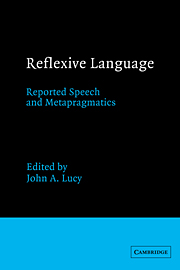Book contents
- Frontmatter
- Contents
- Acknowledgments
- General introduction
- Part I Theoretical foundations
- Part II The relation of form and function in reflexive language
- Part III Text, context, and the cultural functions of reflexive language
- Part IV Interpretation, reported speech, and metapragmatics in the Western tradition
- Introduction to Part IV
- 11 Text, transference, and indexicality
- 12 The importance of reflexive language in George H. Mead's theory of self and communication
- 13 Where epistemology, style, and grammar meet literary history: the development of represented speech and thought
- 14 Metalanguages and subjectivities
- 15 Re-creating Genesis: the metapragmatics of divine speech
- Name index
- Subject index
12 - The importance of reflexive language in George H. Mead's theory of self and communication
from Part IV - Interpretation, reported speech, and metapragmatics in the Western tradition
Published online by Cambridge University Press: 22 January 2010
- Frontmatter
- Contents
- Acknowledgments
- General introduction
- Part I Theoretical foundations
- Part II The relation of form and function in reflexive language
- Part III Text, context, and the cultural functions of reflexive language
- Part IV Interpretation, reported speech, and metapragmatics in the Western tradition
- Introduction to Part IV
- 11 Text, transference, and indexicality
- 12 The importance of reflexive language in George H. Mead's theory of self and communication
- 13 Where epistemology, style, and grammar meet literary history: the development of represented speech and thought
- 14 Metalanguages and subjectivities
- 15 Re-creating Genesis: the metapragmatics of divine speech
- Name index
- Subject index
Summary
“The ‘me’ is a man's reply to his own talk”
Introduction
George Herbert Mead's social psychology is unique for, among other things, its emphasis on linguistic communication to explain the development of the self. For this reason alone it should be of interest to students of language and culture. I will argue that an understanding of his theory depends crucially upon a modern notion of metapragmatics (Silverstein 1976, 1981); hence the relevance of the concerns of this volume to Meadian scholarship.
However, the demonstration of this claim that the idea of metapragmatics is at the heart of Mead's theory of self cannot be easily achieved without a comprehensive overview of his work. There are several reasons for the necessity of such an overview.
To begin with, let us observe with Natanson that “the work of a truly major American philosopher is today largely unknown, frequently misunderstood where it is known, and, more often than not, simply ignored” (Natanson 1956: 1). A major part of the problem must be due to the circumstances under which his thought came to be known. He published relatively little in his own lifetime, the overwhelming part of his oeuvre having been edited by his students at the University of Chicago (particularly Charles Morris) from lecture notes and article drafts collected a few years after his death in 1931.
- Type
- Chapter
- Information
- Reflexive LanguageReported Speech and Metapragmatics, pp. 315 - 338Publisher: Cambridge University PressPrint publication year: 1993
- 4
- Cited by



